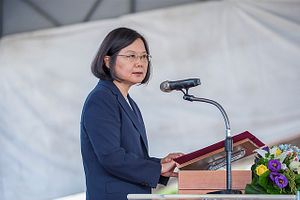The administration of Taiwanese President Tsai Ing-wen, which was inaugurated in May 2017, is Taiwan’s first full-blown Democratic Progressive Party (DPP) government. The government is trying to tackle “old yet new” problems that are both deeply entrenched in Taiwanese society and yet constantly evolving. Specifically, it is attempting to repair the various rifts and fissures that exist within Taiwanese society. While a major rift has existed between mainland Taiwanese (“mainlanders”) and native Taiwanese ever since the February 28 Incident (or 228 Incident), there is also an evident generation gap over the issue of socialism, as can be seen in protest movements such as the Sunflower Movement. In addition to heralding “reconciliation,” the Tsai Ing-wen administration has made stitching together the various cracks in Taiwanese society one of its main policies.
One important term to emerge in this context is “transitional justice.” This can be understood as an attempt to patch together the tear that exists between native Taiwanese and the mainlanders, repairing the historical rift over the era of the Kuomintang (KMT) authoritarian regime. Not only does this involve historical revalidation of major incidents such as the 228 Incident and the White Terror era, but doubtful eyes are also being turned towards KMT assets. For example, with the Republic of China (ROC)’s wartime victory and subsequent claim of sovereignty over Taiwan, assets that were regarded as Japanese national assets during the time of Japanese rule should have become national assets of the ROC (i.e. Taiwan). However, if instead they became assets of the KMT, then that would be illegal, and there would naturally be calls for those assets be transferred over to become Taiwanese national assets. While this would shake the foundations of the KMT’s financial infrastructure, if the whole of Taiwanese society demands it then it may become a necessary measure. However, applying the transitional justice debate to the events of 1945 – events that took place more than 70 years ago – is not exactly commonplace in international terms.
The transitional justice bill has already been passed by Taiwanese legislature, and once President Tsai Ing-wen signs and ratifies it then specific measures will begin to be imposed. It will be a major challenge for Tsai’s government to advance these policies such that the measures for sewing together the rifts in society do not in fact have the opposite effect of enlarging those rifts, and that policy measures aimed at leading the Taiwanese people towards reconciliation do not have the opposite effect of deepening the level of confrontation.
Another major challenge now is the set of 31 preferential policies (or benefits) announced with regard to Taiwan on February 28, 2018 – the anniversary of the 228 Incident – by the People’s Republic of China. The policies were designed in light of Taiwan’s sluggish rate of economic development, the fact that finding employment is difficult even for people with substantial academic backgrounds, and the fact that salaries in Taiwan are not increasing. Through these policies, China is enabling qualifications gained in Taiwan to be used in mainland China, and is providing high salaries and other preferential treatment for Taiwanese people. As a result of these incentives, there is now a real possibility that significant numbers of Taiwanese – including KMT-supporting mainlanders who have been driven into a difficult position by transitional justice, professionals who are discontent with their current situation due to the lack of promotions or salary increases, and particularly the highly educated young people struggling to find employment – may leave Taiwan to seek work in mainland China.
On one side there is the policy of transitional justice being pursued by President Tsai Ing-wen’s government, and on the other there are the 31 preferential policies handed out to Taiwan by the People’s Republic of China. What kind of chemical reaction will occur between these two elements? How will the Tsai Ing-wen administration respond? And how will Taiwanese society face up to this state of affairs? It appears likely that this will be the major challenge for Taiwan in the coming months and years.
Shin Kawashima is a professor at the University of Tokyo.

































